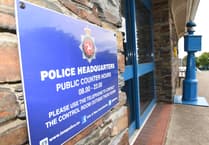Three doctors have spoken out against proposals to legalise assisted dying.
They wrote to us voicing their concerns and yesterday the Independent spoke to two of them.
The public consultation about euthanasia is currently taking place ahead of new legislation.
Ramsey MHK Alex Allinson introduced a bill to the House of Keys on July 14 which would give terminally-ill adults the right to, at their request, with specified assistance, end their own life.
Fiona Baker, a GP, told the Manx Independent: ‘I have a real concern on the impact assisted dying legislation can have on our society.
‘As healthcare professionals working with lots of different people, but particularly vulnerable people at various stages in their life, I can see what a horrible effect that could have on them. I think that picture isn’t being painted or shown at all.
She added: ‘Because it is Dr Allinson who put the bill forward, that may give the impression that all doctors are in support of this. I haven’t met another doctor who is.’
Ben Harris, a palliative care specialist, said: ‘The concern is that by providing that choice to die for the individual the dynamic is that it then becomes almost an enforced obligation, as people are frightened of becoming a burden on their families and friends.’
Dr Baker added: ‘If they are thinking at the end of their life that they are a “burden” or using up resources, whilst nobody is forcing them to make a decision to end their life, they can feel that pressure from society.’
Another concern the doctors voiced was that a safeguard for the bill states that an individual has to have six months left to live.
Dr Harris said: ‘It is always difficult to predict the timeline of terminal illness – how long someone has left to live, especially at the time of diagnosis when you don’t know what the effects of any treatment is going to be on that patient.
‘It sounds like a simple thing, six months to live, but it’s virtually impossible to know that for certain. I’m disappointed that Dr Allinson hasn’t come to speak to anybody involved in this type of care about these kinds of issues.’
Both doctors cited research that showed that in places where assisted dying was allowed, the safeguards gradually fall away.
Dr Baker said: ‘In jurisdictions which have gone down the assisted dying route, any safeguards that have been put in place at the beginning have just very quickly melted away, and the door gets wider and wider.
‘In Canada, it is not just those who are terminally ill, it is those who are unbearably suffering, and then they are trying to open that up to individuals who are mentally suffering, including those with depression, which is just so concerning.’
Dr Harris added: ‘There’s lots of talk about unbearable suffering, but what I know is that suffering is very subjective, and it’s certainly not inevitable.
death
‘The time leading up to somebody’s death can be very valuable for them and their families and friends, a time of reconciliation.
‘There’s no reliable way of producing a peaceful death, by tablets, or injections, when the body isn’t biologically ready to die because our bodies are very resilient. We want to live and if you are six months from dying, your body isn’t thinking of dying at that point.
‘Deaths caused by assisted dying are often quite traumatic as the assisted dying regimes involve huge doses of medication, because drug companies don’t make them in those sizes, they just make normal tablets.
‘I was looking at one of the regimes that they use in Colorado and Hawaii and I calculated it would require taking 385 tablets and you have to take them within five minutes.’
Dr Baker and Dr Harris both think that the introduction of such legislation would have a negative impact on healthcare.
Dr Harris said: ‘The more that a healthcare professional, such as a doctor, actually works with dying people, the more strongly they’re against assisted dying legislation.’
He added: ‘In some jurisdictions that have assisted dying like the Netherlands, at the medical schools there, they teach a lot about how to deliver euthanasia, but not very much about delivering palliative care.
‘So if somebody’s coming to you with a problem, you deal with them in a way that you know, as opposed to a way that you don’t know.
‘The UK is number one in palliative care in the world, and I would say that is because we don’t have assisted dying.
‘If you look at countries where assisted dying is established, particularly Belgium and the Netherlands, they are well down the list in terms of quality of end-of-life care.’
Dr Baker added: ‘We are really struggling to get doctors on the island, especially GPs.
‘Virtually every surgery is trying to recruit somebody, and it’s really difficult to get them here. If we then introduce assisted dying, then I think that recruitment problem will get even worse.’
Both doctors believe that legislation would add pressure on the healthcare service in the island, and that it goes against what individuals are trained to do as healthcare professionals.
Dr Harris said: ‘There’s a quote in healthcare which says, in a patient who is suffering, it’s more elegant to remove the suffering than to remove the patient.’
The third doctor to sign the letter was Neel Umapathy, a consultant surgeon.
The consultation opened on December 1 and will close January 26.




